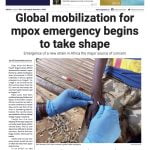The seat of the Greek government in the heart of Athens, the Maximos Mansion, has resembled a war room since late February, ever since the Turkish government began bussing thousands migrants to the Greek-Turkish border to help them illegally cross into the EU via the border town of Evros, a situation that was further compounded by the fact that the Greek government was already in emergency-mode as it continues to deal with the spread of Coronavirus.
The situation on the land borders near Evros, in Greece’e extreme northeast, seem to be calmer, but a new saga is unfolding as both the EU and Turkey are looking to revise the 2016 Joint EU-Turkey Statement that was meant to manage the flood of refugees coming into Europe.
Greek Prime Minister Kyriakos Mitsotakis has already accused Turkey of unilaterally “killing” the Statement.
Mitsotakis’ aides explain to New Europe that Turkey may be trying to show some good faith by not allowing migrants to use a sea route to the Greek islands, however it is violating the core of the Statement by assisting and weaponising the migrant flows across the Greek-Turkish border near Evros. This is a major threat to Greece’s national security and, by extent, Europe’s own borders.
An effort is now being made to revive the Statement and make it effective again.
Having visited Berlin and Vienna on March 9 and 10, and after having met with German Chancellor Angela Merkel and the Chancellor of Austria, Sebastian Kurz, Mitsotakis sent a clear message to Ankara that the tension at the border needs to be de-escalated within the coming days and certainly by the time that the European Council meets on March 26-27 so that Greece can discuss the situation, through its European channels, with Turkey.
This was also the message sent to Turkey’s President Recep Tayyip Erdogan by the Council’s President Charles Michel and European Commission President Ursula Von Der Leyen, who had visited Evros alongside Mitsotakis several days after the most recent crisis erupted.
At the same time, the Turkish authorities are putting forward requests to their European talking partners: except for a new funding for hosting around 4 million refugees and migrants, Turkey is championing for a visa-liberalization for Turkish citizens traveling to Europe, but also for a Customs Union with Europe, taking into consideration that Turkey’s European perspective is considered to be out of the question.
Greece’s demands
The Greek government, however, is also putting requests on the table, given that Turkey is opening up to the possibility of a variety of options for Europe. In his meeting with Merkel, Mitsotakis highlighted two points: Frontex patrols across the Turkish coastline and not solely in Greek territorial waters need to be established and the right to return illegal migrants to Turkey from both the islands and the Greek mainland must be allowed. Merkel did not immediately agree to the Greek requests, but, according to a participant as the meeting, the German Chancellor said she would “take it them into consideration”.
These two points are described as essential by officials familiar with the situation. The broader role of Frontex and its presence also across the Turkish coastline is considered of utmost importance, since vessels with migrants can be deterred from leaving Turkey’s territorial waters and be returned to the Turkish coast.
As for the returns, according to an interpretation of the 2016 Joint Statement, Greece’s authorities are legally allowed to return all illegal immigrants from the islands. The reason for this was due to the fact that the mass overcrowding of the islands, where the migrants’ asylum applications are processed, has led to a growing humanitarian crisis on the islands given the slow pace of the processing. Of applications.
Greece now wants to address this issue and de-congest the islands, but Turkey will have to accept taking back migrants also from controlled refugee facilities in the mainland.
Long process ahead
What Greek government officials are signaling is that there is a long process ahead since Erdogan’s handling of the situation has deeply annoyed most of the 27 members of the European Union, now of which want to re-enter a dialogue with Turkey under the cloud of being blackmailed by Erdogan with a new wave of refugees.
The efforts to address the problem started in Brussels and, within the coming weeks, the EU’s High Representative for Foreign Affairs, Josep Borell, will iron out the points that need to be re-adjusted alongside Turkey’s Minister of Foreign Affairs, Mevlut Cavusoglu.
Borell will be in close contact especially with the authorities of the countries that are in Europe’s frontline, but especially with Greece, since the country is considered the EU’s external border to Turkey.
According to estimates by diplomatic sources, it is highly unlikely that an end-result will be produced within the next two weeks, or by the time the upcoming EUCO Summit is due to be held.







